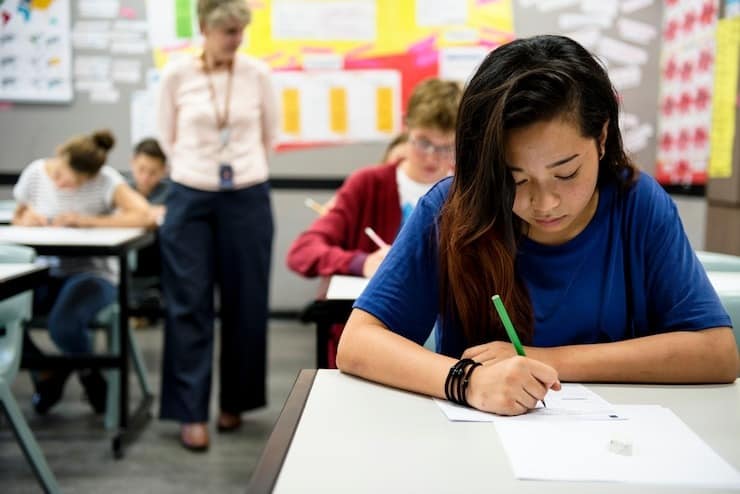By Prof. Saroj Sharma and Dr. Sunita J. Kathuria
A significant number of children who prepare for their exams, particularly the board exams, experience anxiety and stress related to their academic performance, which leads to a variety of mental and physical health problems. Children frequently feel pressure to live up to the expectations placed on them by parents and family, teachers and school system, peer group, media, and community at large. Therefore, it is important to strike a balance between supportive interventions and academic expectations in order to help children overcome the challenges of exams. The research studies conducted to assess the measure of stress and anxiety revealed that students report physical discomfort, including headaches, increased heart rate, elevated blood pressure, stomachaches, abdominal pain, muscle tension, backaches, constant fatigue, constipation, diarrhea, and sleep disturbances, and cognitive effects. The board students are vulnerable to stress and anxiety as they are at a significant period of physical and emotional transformation. The studies mention that chronic stress has been linked to altered brain structure and function, including reduced executive and memory function and elevated anxiety and depression. These alterations may persist for years and affect one’s ability to succeed in school and the workplace in the future.
Teachers and Parents: Time to calm down and plan
As we take a closer look at “exam stress”, the two most important people in a child’s life are their parents and teachers.
Open communication, providing emotional support, promoting positive mindset, validating child’s feelings, identifying triggers, teaching relaxation techniques, encouraging physical activity and healthy habits, providing assurance and re-assurance, teaching stress management, encourage expression are some of the ways to deal with the exam stress. By removing uncertainty and offering clear expectations and study materials, teachers can help students feel more prepared and confident. Teachers can incorporate stress-reduction strategies into the curriculum by instructing students in mindfulness and relaxation techniques that they can practice on difficult days.
A caring and supportive home environment is just as important in assisting in overcoming the challenges and stress of exams. It entails offering assistance, inspiration, and understanding while upholding a sensible equilibrium between the student’s wellbeing and academic expectation. Mindful parenting includes supporting, understanding, and being there for your child as they navigate the pressures and challenges of exams.
“Inform your child that no matter how well they do on their exam,
you are always here for them” is something very important.
Allow your kids to express their emotions and discuss exams without criticizing them. They should not be burdened with excessive demands for excellence. Help them in creating a study schedule that includes breaks and downtime. As a parent, give helpful support, such as a quiet study space, healthy snacks, and the necessary study materials. It is important to teach kids self-care and relaxation skills, such as deep breathing exercises, short walks, and calming music. Further while it is important to be involved, parents should not micromanage kid’s study regimen. Allow them to handle their own schedules and responsibilities with a certain amount of autonomy and responsibility. Acknowledge small successes and important turning points in the exam-taking process instead of concentrating only on the final results.
“Celebrate efforts, not just Results”
Encourage an attitude that places learning and growth ahead of merely achieving high grades. Whenever child have difficulties, remind them of their past successes and assets and maintain a positive outlook and believe in your child’s abilities.
Role of other stakeholders in mitigating Exam Stress
Collaboration between multiple stakeholders who each have a unique role to play in supporting students’ well-being is necessary to address the stress that children experience during exams. Developing procedures and policies that promote students’ general wellbeing is the responsibility of school administrators. In addition to making sure that academic standards are reasonable, they can put stress-reduction strategies into action and foster a positive school climate. Not only the school system, media can help by supporting initiatives that promote healthy learning habits, offering educational resources, and encouraging positive and balanced portrayals of academic success.
NEP (2020) and Mental Health of students
The National Education Policy (NEP, 2020) addressed the concern of mental health of students through various recommendations for different stakeholders. To address students’ mental health needs, the policy suggests offering counseling services and support networks within schools. It acknowledges the value of psychological and emotional support in the classroom.
Given the gravity of these emotions, it’s critical to act quickly to obtain assistance. In such situation, we must understand that
‘asking for help is a show of strength’
and there exists various ways to deal with stress and mental health issues. Helpline, crisis intervention services, and mental health specialists are readily accessible to provide assistance and direction in numerous nations. Although, stress encourages alertness and cautious behavior, a certain amount of stress is actually thought to be helpful and beneficial. Children are aided in making appropriate preparations as a result, but when it gets out of control, it can have terrible consequences. Many children figure out how to handle the stress of tests on their own—making a schedule, talking to friends, studying more, watching TV, participating in extracurricular activities, talking to parents or other adults, working out, etc.—some children require more support and guidance than others. But, if required, it is always suggested to get help from a mental health professional, counselor, or a trustworthy person in your life.
‘Self Confidence matters: Every child has a unique potential’
It is always important to keep in mind that every child is different and that certain strategies may or may not work. Hence, it is critical to modify plan in light of child’s unique requirements and character.
The authors Prof. Saroj Sharma
Chairperson, NIOS and Dr. Sunita J. Kathuria
Consultant (Reasearch & Evaluation), NIOS
-PIB








